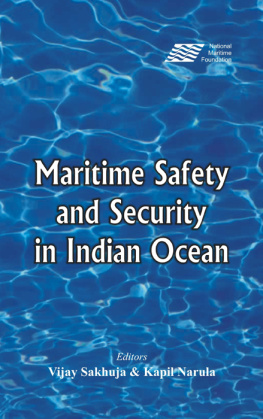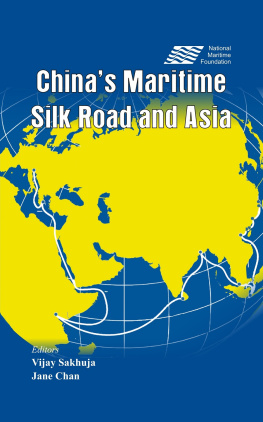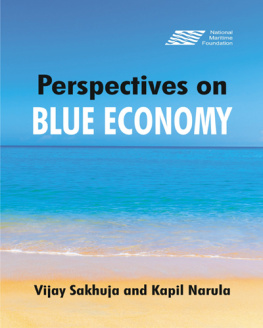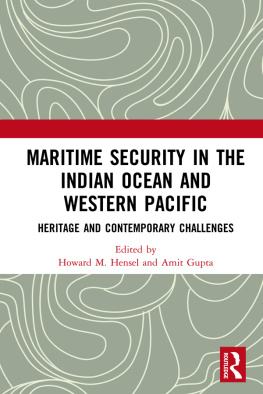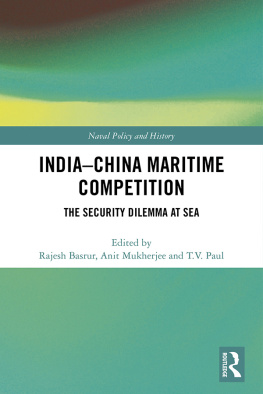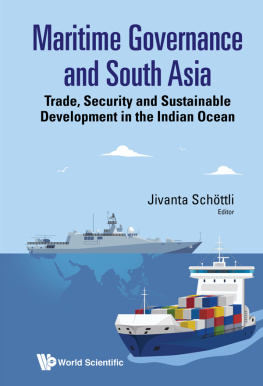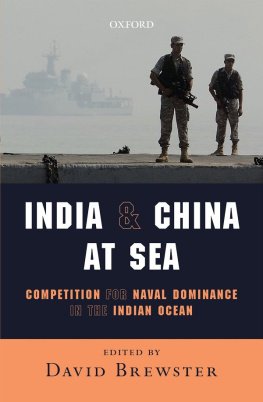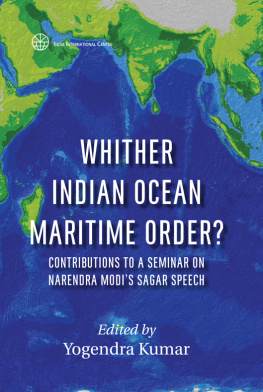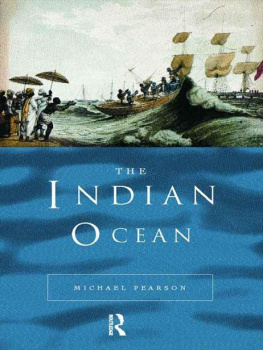Published by
Vij Books India Pvt Ltd
(Publishers, Distributors & Importers)
2/19, Ansari Road
Delhi 110 002
Phones: 91-11-43596460, 91-11-47340674
Fax: 91-11-47340674
e-mail:
web: www.vijbooks.com
Copyright 2016, National Maritime Foundation
First Published : 2016
ISBN:978-93-85563-78-2 (Hardback)
ISBN:978-93-85563-79-9 (ebook)
Price in India : Rs.695/-
All rights reserved.
No part of this book may be reproduced, stored in a retrieval system, transmitted or utilised in any form or by any means, electronic, mechanical, photocopying, recording or otherwise, without the prior permission of the copyright owner. Application for such permission should be addressed to the publisher.
The views expressed in this book are those of the contributors in their personal capacity. These do not have any institutional endorsement.
Printed and bound in India
Foreword
As the third-largest body of water on Earth, the Indian Ocean is vital for shipping lanes that connect Asia, Oceania and Africa to the rest of the world. The developments in the Indian Ocean affect not only the two billion people living in the countries of the Indian Ocean Region (IOR), but also those in other parts of the globe. Importantly, such interests have manifested over many centuries in the past in various forms including super-power rivalry. The ongoing resurgence of Asia, accompanied by the vigorous economic interactions involving the Asian countries is likely to enhance the salience of the Indian Ocean in the coming decades in a manner that the world has probably never witnessed earlier.
In the context of the rise of Asia, a glance at world history is instructive. It cautions us that the rising level of economic development in our region is not given, and regional prosperity is not pre-ordained; instead, regional countries have to overcome a number of challenges confronting maritime safety and security ranging from regulation of human activities at sea to the impending perils of climate change.
It is encouraging to see that the evolution of the Indian Ocean Rim Association (IORA) from being a nascent grouping of regional countries taking tentative steps to constructively share their economic and cultural diversities to the interconnectedness that the organisation has achieved today. It is also fortuitous that the visionary leadership guiding the IORA realized that economic well-being and prosperity is inextricably linked with good order, safety and security
I am confident that with the momentum that the IORA is gathering, we would be able to overcome the future adversities collectively through identifying appropriate regional solutions This book is a continuing endeavour and I hope that the views expressed by the participants in this book and the robust process of building consensus through dialogue leads to adoption of specific recommendations which would enhance maritime safety and security in the Indian Ocean.
Admiral DK Joshi,
PVSM, AVSM, YSM, NM, VSM (Retd.)
Chairman
National Maritime Foundation
July 01, 2016
Keynote Address
It is with great pleasure that I join this distinguished group at the IORA Meeting of Experts on Maritime Safety and Security organized by the National Maritime Foundation. I thank all our foreign visitors for their participation in this event and I would like to express appreciation for National Maritime Foundation for the hard work that has gone into organizing this meeting and bringing together the experts and stakeholders gathered here.
The Indian Ocean has facilitated flows of commerce, knowledge as well as culture, and religion across our region since time immemorial. The vast Indian Ocean region is home to nearly 40% of world population. It is almost self-evident that this region holds immense opportunities for the future.
With sustained economic growth in the countries on the littoral of the Indian Ocean, growing global engagement with regional players, as well as the ongoing shift in the global economys centre of gravity towards Asia, the Indian Ocean has acquired an ever-higher profile. At the same time the region faces challenges flowing from non-traditional threats such as natural disasters, piracy, terrorism, illegal fishing, oil spills and the effects of climate change.
In recent years, the salience of IORA has been growing significantly. This is evident from the fact that the number of States, members of IORA has been growing from 18 in 2011 to 21 in 2015. It is noteworthy that four of five Permanent Members of the UN Security Council are among the six Dialogue Partners of IORA. The number of IORA members and Dialogue Partners is expected to grow further. IORA member countries have shown renewed interest in participating in and launching a number of programmes to coordinate between regional economies in a diverse range of areas and activities. We see IORA as an apex body in the Indian Ocean Region that can respond effectively to the needs of and to enhance individual and collective capacities of Member-States to tackle contemporary challenges of sustainable and balanced economic growth, development and common maritime domain issues.
We in India would like to work with our partners in IORA for a more cooperative and integrated future, and for closer collaboration for the region through the promotion of trade, investment, tourism, infrastructure development, marine science and technology, sustainable fisheries and protection of the marine environment.
The Indian Ocean region from Africas East coast to West Asia, South Asia and South East Asia and reaching Australia has been in the spotlight of Indias foreign policy. Our Prime Minister, Shri Narendra Modi, has succinctly described Indias approach in the region as SAGAR Security and Growth for All in the Region. India seeks to enhance mutual cooperation in our region, to offer our capabilities for the mutual benefit of all in our common oceanic home and assist our neighbours and island states in building their maritime security capabilities. We will all prosper when the seas around us are safe, secure and free for all. We therefore seek collective action and cooperation in the region.
From this perspective, IORA provides an effective multilateral platform that facilitates realization of hitherto untapped opportunities for prosperity, peace and development of the region. India has been working closely with IORA partners to consolidate cooperation under and through this pan-Indian Ocean forum. At the 11th meeting of the IORA Council of Ministers that took place during Indias Chairmanship in Bengaluru in November 2011, the members identified six priority areas for cooperation in coming years:
(a) Maritime Safety and Security;
(b) Trade and Investment Facilitation;
(c) Fisheries Management;
(d) Disaster Risk Reduction;
(e) Academic and S&T Cooperation ; and
(f) Tourism Promotion and Cultural Exchanges.
I would submit that experts gathered here for this meeting may look at maritime safety and security issues comprehensively in the IORA context keeping in mind that IORAs primary focus is sustained growth and balanced economic cooperation in the region. This meeting is being hosted in this broader context of IORA cooperation in the six priority areas which include maritime safety and security. The outcomes of discussions here should be focussed, implementable and should factor in both the larger context of IORA and through that perspective focus on maritime safety and security the theme of this event.


